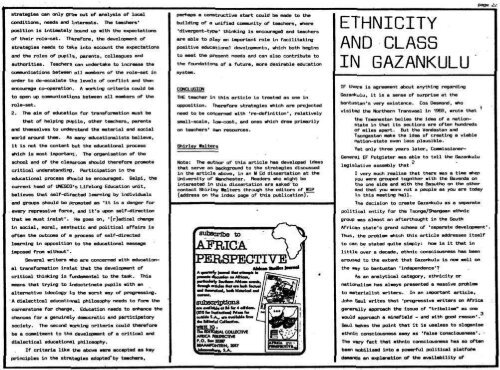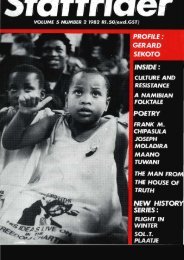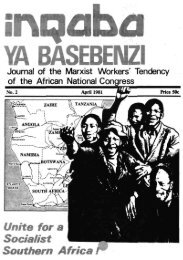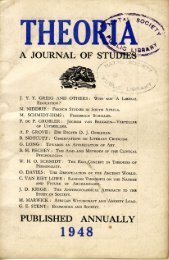Create successful ePaper yourself
Turn your PDF publications into a flip-book with our unique Google optimized e-Paper software.
strategies can only prow out of analysis of local<br />
conditions, needs and Interests. The teachers*<br />
position is intimately bound up with the expectations<br />
of their role-SBt. Therefore, the development of<br />
strategies needs to take into account the expectations<br />
and the roles of pupils, parents, col leagues and<br />
authorities. Teachers can undertake to increase the<br />
communlcations between oil members of the role-set In<br />
order to de-escalata the levels of conflict end than<br />
encourage co-operation. A working criteria could be<br />
to open up communications between all members of the<br />
role—sat.<br />
2. The slat of education for transformation must be<br />
that of helping pupils, other teachers, parents<br />
and themselves to understand the material and social<br />
world around them. As many educationalists believe,<br />
it Is not the content but the educational process<br />
which is aost important. The organisation of the<br />
school and of the clsssrooa should therefore proaote<br />
critical understanding. Participation in tha<br />
educational process should be encouraged. Gelpi, the<br />
current head of UNESCO's Lifelong Education unit,<br />
believes that self-directed learning by Individuals<br />
and groups should be promoted as 'it is s danger for<br />
every repressive force, and it's upon self-direct ion<br />
that we aust insist*. He goes on, '(r)adlcel change<br />
in social, aorel, aesthetic and political affairs is<br />
often the out COM of a process of self directed<br />
learning in opposition to tha educational message<br />
imposed f rcai el thout * *<br />
Several writers who are concerned with education<br />
al transformation insist that the development of<br />
critical thinking Is fundamental to the task. This<br />
means that trying to indoctrinate pupils with an<br />
alternative Ideology is the worst way of progressing•<br />
A dialectical educational philosophy needs to farm tiie<br />
cornerstone for change. Education needs to enhance the<br />
chances for a genuinely democratic and participatory<br />
society. Tha second working criteria could therefore<br />
be a ooaatltSKsnt to the development of e critical and<br />
dlalectlcel educational philosophy.<br />
If criteria like the above were accepted as key<br />
principles in the strategies adoptmd'by teachers.<br />
perhaps a constructive start could be made to the<br />
building of a unified community of teachers, where<br />
"divergant-typ*< thinking is encouraged and teachers<br />
are able to play an important role In facilitating<br />
positive educational developments, which both begins<br />
to meat the present needs and can also contribute to<br />
the foundations Qr * future, more desirable education<br />
system.<br />
CONCLUSION<br />
THE teacher in this article is treated as one in<br />
opposition. Therefore strategies which are projected<br />
need to be concerned with "re-def inition• , relatively<br />
small-scale, low-cost, and ones which draw primarily<br />
on teachers' Own resources.<br />
Shirley "alters<br />
Note: The author of this article has developed ideas<br />
that serve as background to the strategies discussed<br />
in the erticla above, in an U Ed dissertation at the<br />
University of Manchester. Readers who might be<br />
interested in this dissertation are asked to<br />
contact Shirley Baiters through the editors of IP<br />
(address on the index page of this publication).<br />
subscribe to<br />
IAPRIGA<br />
PEBSPEGTIVE<br />
t«mwiewAMowt,<br />
•wAmJwwM<br />
emekft met mm sen fwmwml<br />
subscriptions<br />
»«*ettwW*tw4hr4«*<br />
(MO fur I ^ M M W—<br />
emmVJi IA, mm pwataft<br />
imMmmalCettadhe.<br />
COUKITVE<br />
tettVtCTfvt<br />
fctAAJrftWTZIN, 2D17<br />
ETHNICITY<br />
AND CLASS<br />
IN GAZANKULU<br />
IF there is agreement about anything regarding<br />
Gazankulu, it is a sense of surprise at the<br />
bantustan's very existence. Cos Desmond, who<br />
visited the Northern Transvaal in 1969, wrote that<br />
the Tswanastan belles the idea of a nation*<br />
state In that its sections are often hundreds<br />
of miles apart. But the Vendastan and<br />
T&ongastan woke the idea of creating a viable<br />
nation-state even less plausible.<br />
Vet only three years later. Commissioner-<br />
General EF Potgieter ems able to tell the Gazankulu<br />
legislative assembly that<br />
I very much realise that there was a time when<br />
you were grouped together with the Bavende on<br />
the one side and with the Besutho on the other<br />
and that you eere not a people as you are today<br />
in this meeting hall.<br />
The decision to create Gerankuiu as a separate<br />
political entity for the Tsonga/9*angoen ethnic<br />
group was almost an afterthought in the South<br />
African state's grand scheme of 'separate development'<br />
Ihus, the problem which this article addresses Itself<br />
to can be stated quite simply: how is it that in<br />
little over a decade, ethnic consciousness has been<br />
aroused to the extent thet Gazankulu is nom well on<br />
the way to bentustan * independence*?<br />
as an analytical category, ethnicity or<br />
nationalism has always presented a massive problem<br />
to materialist writers. In an important article,<br />
John Saul writes that 'progressive writers on Africa<br />
generally approach the Issue of "tribalism* as one<br />
mould approach a minefield - and with good reason'.<br />
Saul makes the point that It Is useless to slogenisa<br />
ethnit consciousness away as 'false consciousness** •<br />
The vary fact that ethnic consciousness has so often<br />
been mobilised into e powerful political platform<br />
demands an explanation of the availability of<br />
t*xje «V

















